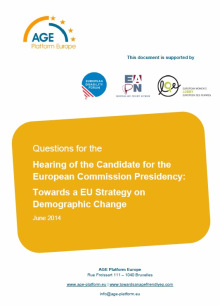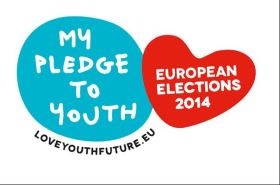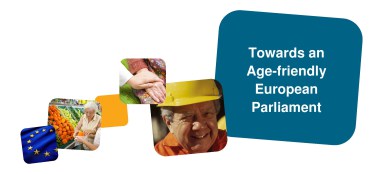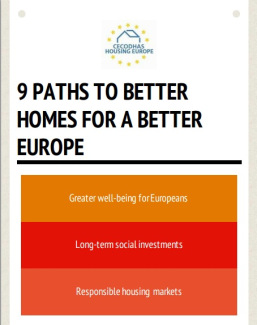PVÔ - the largest seniors’ organization in Austria - is fully engaged in the EU elections campaign. On 29 April, senior representatives from all over Austria met under the slogan: “For a better Europe!” at the European Conference of PVÖ.
“The EU election on May 25 is a fate choice for Europe, for Austria, for all of us. Especially for the older generation, there is much to gain, but also very much to lose! One thing is certain: Europe needs a change of direction! Let us fight for a new, a better Europe,” said Karl Blecha, President of Austria (PVÖ) Pensioners Association in his speech at the European Conference.
Der Pensionistenverband Österreichs - die größte und mitgliederstärkste Seniorenorganisation Österreichs - engagiert sich mit voller Kraft im EU-Wahlkampf. Am 29. April trafen sich SeniorInnenvertreter aus ganz Österreich unter dem Motto: “Für ein besseres Europa!” bei der Europa-Konferenz des PVÖ.
„Die EU-Wahl am 25. Mai ist eine Schicksalswahl für Europa, für Österreich, für uns alle. Besonders für die ältere Generation gibt es viel zu gewinnen, aber auch sehr viel zu verlieren! Fest steht: Europa braucht einen Richtungswechsel! Kämpfen wir für ein neues, ein besseres Europa “, betonte Karl Blecha, Präsident des Pensionistenverbandes Österreichs (PVÖ) in seiner Rede bei der Europa-Konferenz.
“26 Tage trennen uns noch von der Wahl zum Europäischen Parlament. Diese Wahlen sind von enormer Bedeutung! Denn noch nie war die Chance auf einen Richtungswechsel in Europa so groß, noch nie hatte eine Stimme bei einer EU-Wahl so viel Gewicht! Wir müssen diese Stimme nutzen um zu zeigen, dass wir ein anderes, ein besseres Europa wollen”, donnerte der PVÖ-Präsident unter dem Applaus der über 350 SeniorInnenvertreterInnen aus ganz Österreich.
Denn eines ist klar, so Blecha: “Wir sind unzufrieden mit der derzeitigen EU-Politik der Konservativen und Neoliberalen.” Und dass eine Beibehaltung dieser Politik die derzeitige Situation in Europa noch deutlich verschlimmern würde, zeigt eine aktuelle europäische Studie, die eine starke Zunahme der Arbeitslosigkeit, steigende Armut, Konflikte um Rohstoffe und sinkende Lebensstandards prognostiziert. “So würde die Zukunft aussehen, wenn wir nicht gegensteuern. Daher brauchen wir einen Richtungswechsel. Es muss Schluss sein mit der Politik für Banken, Spekulanten und Lobbyisten! Sie haben nur 27 Millionen Arbeitslose und sinkende Sozialstandards gebracht. Wir müssen auf das Desaster, das die Neoliberalen und Konservativen verursacht haben, reagieren und eine Änderung herbeiführen!”, stellte Blecha klar.
PVÖ unterstützt KandidatInnen der SPÖ zur EU-Wahl
Aber “raus aus der EU und Grenzen dicht” - das Programm der FPÖ oder “alles Privatisieren und Aushöhlen der Sozialsysteme”, wie es z.B. die NEOS fordern ist der falsche Weg. “Was wir jetzt brauchen ist der kompromisslose Kampf gegen Arbeitslosigkeit, ein Sozialpaket, das Armut verhindert und Lohndumping bekämpft. Wir brauchen strenge Kontrollen und Regeln für Banken, um eine zweite Hypo-Alpe-Adria wie sie uns die Haider-Strache-Partei eingebrockt hat zu verhindern. Wir müssen Steuerbetrug bekämpfen und sensible private Daten schützen. Wir müssen für sichere Lebensmittel, eine saubere Umwelt und nachhaltige Energieformen eintreten. Für all das stehen die europäischen und österreichischen Sozialdemokraten. Daher unterstützt der Pensionistenverband Österreichs, die starke Stimme und Interessensvertretung der älteren Generation, die KandidatInnen der SPÖ zur EU-Wahl. Denn es ist nicht egal, wie die Wahl ausgeht, es ist nicht egal, wer in Europa und Österreich die Nummer 1 ist! Krempeln wir die Ärmel hoch! Für ein neues, ein besseres Europa”, so der PVÖ-Präsident.
Auf dem Programm der eintägigen Konferenz im C3 Convention Center in Wien standen auch Reden von Eugen Freund, SPÖ-Spitzenkandidat für die Europawahlen, Europas Seniorenkandidat Nr. 1, Univ. Prof. Josef Weidenholzer und SPÖ-Bundesgeschäftsführer Norbert Darabos.
Freund: Wir wollen ein Europa, in dem der Mensch im Mittelpunkt steht und nicht die Lobbys und Konzerne
SPÖ-EU-Spitzenkandidat Eugen Freund betonte in seiner Rede dass die kommende EU-Wahl die Chance auf einen “Kurswechsel hin zu einem sozialeren und gerechteren Europa” biete. “Europa braucht dringend diesen Kurswechsel und nur eine starke Sozialdemokratie ist Garantin dafür”, betonte Freund, denn: “Es ist nicht egal, wer in Europa den Ton angibt, ob Konzerne die sozialen Standards vorgeben oder die Sozialdemokratie Seite an Seite mit den Gewerkschaften für faire Löhne kämpft, ob AKW gebaut oder erneuerbare Energien forciert werden, ob wir sichere Lebensmittel oder genverändertes Essen auf unseren Tellern haben!” Für den SPÖ-EU-Spitzenkandidaten steht fest: “Wir wollen ein Europa, in dem der Mensch im Mittelpunkt steht und nicht die Lobbys und Konzerne!”
Weidenholzer: Mit voller Kraft für die Interessen der älteren Generation – gegen den Privatisierungswahn
Europas Seniorenkandidat Nr. 1 Univ. Prof. Josef Weidenholzer, der starke Vertreter der älteren Generation im Europäischen Parlament, unterstrich: “Ich vertrete diese Interessen gerne, aber auch mit einer Portion Wut.” Denn Neoliberale, die in der EU wie “Irrlichter” umhergeisterten, hätten einen Generationenkonflikt vom Zaun gebrochen. Man dürfe jedoch die eine Generation nicht gegen die andere ausspielen. Das gelte vor allem für jene Neoliberalen, “die jahrelang nichts gegen die hohe Jugendarbeitslosigkeit in der EU unternommen haben und damit diesen Konflikt geschürt haben”, sagte Weidenholzer. Weidenholzer, der bereits die Privatisierung des Wassers erfolgreich verhindern konnte, betonte, dass er sich auch weiterhin mit voller Kraft für den Schutz der öffentlichen Daseinsvorsorge einsetzen wird: “Bei Privatisierungen geht es um Gewinne, nicht um Qualität. Das hat man nicht zuletzt bei der der privaten Altersvorsorge gesehen, die gescheitert ist. Die öffentliche Daseinsvorsorge hat Europa ausgemacht. Sie darf nicht vollständig in private Hände gelangen!“.
Darabos: Generation 50Plus wird diese Wahl maßgeblich mitentscheiden
SPÖ-Bundesgeschäftsführer und EU-Wahlkampfleiter Norbert Darabos stellte klar, dass es das Ziel der Sozialdemokratie ist, stärkste Kraft in Europa zu werden: “Es geht um viel bei dieser Wahl. Es geht darum, die Politik der Europäischen Union neu zu gestalten.” Die Generation 50Plus werde diese Wahl maßgeblich mitentscheiden, betonte Darabos. “Es geht um die Zukunft von 500 Millionen Menschen. Wir haben die Chance, mit Martin Schulz als Spitzenkandidat der Europäischen Sozialdemokraten, einen Politikwechsel in Europa einzuleiten.”




